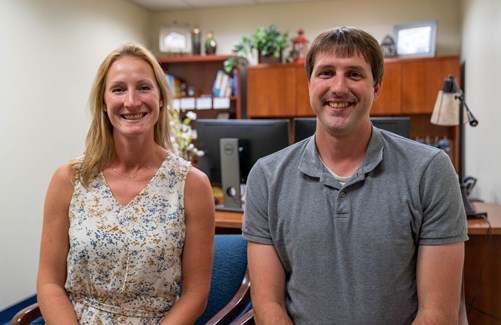Welcome Back!
We couldn’t be more excited to use those words. The last year and a half has been long, isolating, and has felt defeating at times. We are excited to see students walking around campus again. It has been far too long. With that being said, maybe some of you aren’t excited and rather nervous, scared, or intimidated by all the unknowns. First things first, let’s prepare our mindset for challenges, setbacks, and a constant need to pivot this year. The more we can avoid assuming that everything will go just grand and perfect, the more able we can be resilient through life’s challenges.
As Roy T Bennett stated, “Life is about accepting the challenges along the way, choosing to keep moving forward, and savoring the journey.”
Lastly, let’s focus on our mental health. Did you know that mental health concerns are on the rise? The pandemic has caused an uptick in mental health concerns for college-aged students, including graduate and professional students. Shoot, even the mental healthcare professionals have seen a rise in concerns. Silver lining – we have all struggled in some way this past year and now have an opportunity to really start new. We’ve lost ourselves in the blurred line of school/work/life balance, and the hope is that with more in person activities and structure, we can really begin to take better care of ourselves.
How can you focus on your mental health this year?
Here are a few simple tips to get started:
- Let’s not lose ourselves to our program. Yes, you are here to get your degree, but life is about finding balance. Whenever we lose that balance and put all of our eggs into one basket, neglecting other areas of wellbeing that are important to us – well, we start to suffer. We will suffer emotionally, physically, and mentally. So it is critical to find small increments of time to engage in self-care. Self-care is the decision to replenish and care for yourself in the midst of life’s daily chaos. Self-care is about doing things you enjoy doing, even if you have to get creative with your time. A few simple self-care strategies might include:
- Mindful walking to and from class, clinic, or campus
- Diaphragmatic breathing throughout your day
- Expressing gratitude to start or end your day
- Movement. This doesn’t just mean staying physically active, but taking small study breaks to move around, stretch, take a 5 minute walk, or engage in a brief yoga session
- Listening to an audiobook as you walk/drive to and from campus
- Connecting with others in meaningful ways
- Treating yourself to a fancy coffee to start your week
- Soothing through your senses. Think of specific things that are calming, soothing, relaxing, or that bring you joy from your senses (sight, sound, taste, touch, and smell). An example of a soothing list might be listening to smooth jazz, having an iced americano, wearing comfy clothes, turning on a diffuser with lavender, and being in nature. What might be yours?
- Let’s be compassionate with ourselves. As humans, we typically are more likely to show compassion for others than ourselves. One of our favorite questions to ask if this: What would you say to a friend going through this struggle right now? Usually, the answer is always “I’d be more kind and offer more support."
According to Dr. Kristen Neff, self-compassion entails “being warm and understanding towards ourselves when we suffer, fail, or feel inadequate, rather than ignoring our pain or flagellating ourselves with self-criticism.” She also talks about how suffering and personal inadequacy are shared human experiences. Nobody is perfect and we experience mixed emotions on a daily basis.
So rather than focusing on the things that are happening to “me”, we try and recognize that these things happen to others and we are not alone. Lastly, self-compassion involves mindfulness practices. Neff states “mindfulness is a non-judgmental, receptive mind state in which one observes thoughts and feelings as they are, without trying to suppress or deny them. We cannot ignore our pain and feel compassion at the same time.”
If you are reading this right now and wondering how to practice this, I’d encourage you to check out her website for many free resources. You can access it here: Self-Compassion - Reach out! This doesn’t necessarily mean reaching out to BeWell, but it can mean reaching out to a friend, a classmate or a professor/adviser. Be honest with how you are doing and what you need. More often than not, we are terrified of opening up and might have thoughts such as:
- What if I am a burden?
- What if they think differently of me?
- What if they can’t help me?
The “what if” game is dangerous! When we start thinking of things that could go wrong, we tend to feel worse, more anxious, and uneasy. I’d encourage you to try and re-frame those thoughts to:- What if I am not a burden and they want to help?
- Is thinking this way really helping me right now?
- I won’t know if they can help me unless I ask.
- What would I tell a friend right?
- Lastly, you can always reach out to us at BeWell. BeWell is a part of the Carruth Center, which is the main counseling center at WVU – however, we are a satellite office embedded over on Health Sciences Campus. Our mission is to serve HSC students. If you are interested in setting up an appointment to discuss services, please visit our website for information on how to do so.
Take good care!
The BeWell Team, aka Layne and Seth
